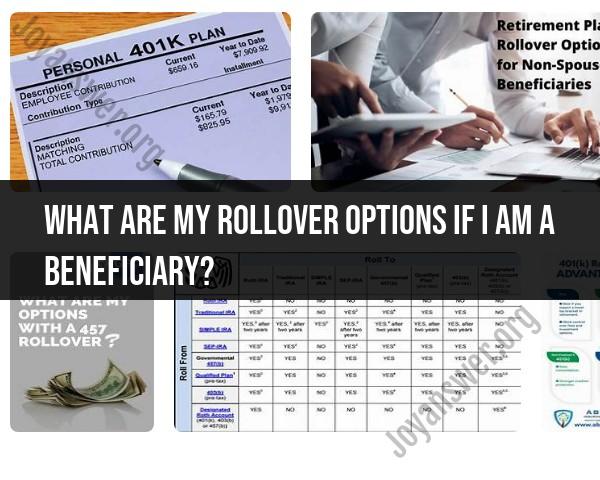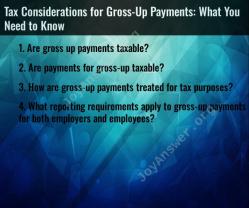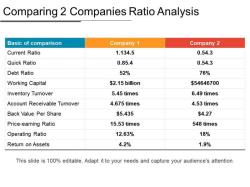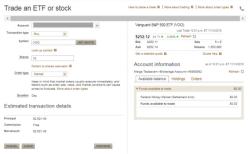What are my rollover options if I am a beneficiary?
As a beneficiary of an inherited retirement account, you have several options for managing the inherited assets. The specific options available to you depend on the type of retirement account, the relationship between you and the original account owner, and certain deadlines. Here are some of the rollover options for beneficiaries:
Inherited IRA (Individual Retirement Account):
Spousal Beneficiary: If you are the spouse of the deceased account owner, you have the option to roll over the inherited retirement account into your own IRA. This is known as a spousal rollover, and it allows you to treat the inherited account as if it were your own. You can choose to inherit a Traditional IRA or a Roth IRA.
Non-Spousal Beneficiary: If you are a non-spouse beneficiary, you can set up an Inherited IRA. The rules and options for Inherited IRAs vary depending on whether the original account was a Traditional IRA or a Roth IRA. With an Inherited IRA, you will typically be required to take Required Minimum Distributions (RMDs) over your life expectancy, and the distributions may be subject to taxes.
Lump-Sum Distribution:As a beneficiary, you have the option to take a lump-sum distribution from the inherited retirement account. This means you would withdraw the entire balance. Be aware that this may have tax implications, and you may need to pay taxes on the distribution. It could also push you into a higher tax bracket.
Five-Year Rule:Non-spouse beneficiaries who do not choose to set up an Inherited IRA have the option of using the "Five-Year Rule." This means you must withdraw the entire balance of the inherited retirement account within five years of the original account owner's death. The timing and amounts of distributions are flexible within the five-year period.
Disclaim the Inheritance:In some cases, you may choose to disclaim, or refuse, the inheritance. This can be done for various reasons, such as to allow the assets to pass to contingent beneficiaries or to manage potential tax consequences. Rules and deadlines for disclaiming an inheritance vary by jurisdiction and may be subject to specific legal requirements.
Combine Options:In some situations, you can combine multiple options. For instance, if you are a non-spouse beneficiary, you can choose to take the RMDs over your life expectancy while also taking additional distributions to reduce the balance faster.
It's important to note that the rules and options for inherited retirement accounts can be complex, and tax implications vary depending on the type of account, your relationship to the deceased, and other factors. Therefore, it's highly recommended that you consult with a financial advisor or tax professional to make informed decisions based on your specific situation and to ensure that you comply with all IRS regulations and deadlines.
Rollover Options for Beneficiaries in Financial Planning
When a person inherits a retirement account or other financial asset, they have several options for what to do with it. One option is to roll over the asset into their own account. This can be a good option if the beneficiary wants to continue to defer taxes on the asset or if they want to have more control over the investment options.
What Happens to an Inherited Account or Asset
When a person inherits an account or asset, they become the new owner of that asset. This means that they are responsible for paying any taxes on the asset and for making decisions about how to invest it.
Tax Implications and Considerations for Beneficiary Rollovers
The tax implications of a beneficiary rollover will depend on the type of asset that is being rolled over. For example, if the beneficiary rolls over an inherited IRA into their own IRA, they will not have to pay taxes on the rollover. However, if they roll over an inherited taxable account into their own taxable account, they will have to pay taxes on any gains that have been realized on the asset.
Making Informed Choices About Beneficiary Rollovers
Before making a decision about whether or not to roll over an inherited asset, it is important to consider the following factors:
- Tax implications: The beneficiary should understand the tax implications of the rollover before making a decision.
- Investment options: The beneficiary should consider the investment options available to them before making a decision.
- Personal financial goals: The beneficiary should consider their own personal financial goals before making a decision.
Beneficiary Rollover Strategies for Different Situations
The best beneficiary rollover strategy will depend on the individual's circumstances. However, here are some general guidelines:
- If the beneficiary is young and has a long time horizon, they may want to consider rolling over the asset into a Roth IRA. This will allow them to grow the asset tax-free.
- If the beneficiary is nearing retirement age, they may want to consider rolling over the asset into a traditional IRA. This will allow them to defer taxes on the asset until they retire.
- If the beneficiary needs the money immediately, they may want to consider cashing out the asset. However, they will have to pay taxes on any gains that have been realized on the asset.
It is important to consult with a financial advisor to discuss the best beneficiary rollover strategy for your individual situation.













